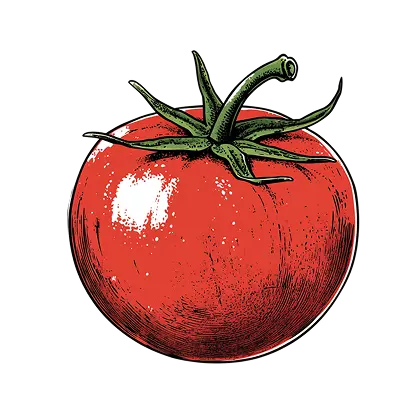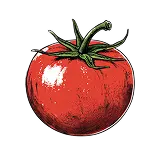

Tomato (noun) — juicy, typically red/yellow/orange-colored fruit (according to some botanical classifications) with a refreshing taste and great nutritional value.
Tomatoes are irreplaceable in salads and dishes with meat, adding more vitamins and being low in calories. They can be eaten raw, baked, mixed with oil, added to pasta or in other ways.
How to Pronounce “Tomato”?
If you like to say it in the American variant, it is better to pronounce it like “to-may-to,” while the UK typical option is all about a stronger “ah.”
Level up your English with Koto!
Examples: How to Use “Tomato” in a Sentence?
Such a general word can be met in various topics beyond the kitchen, so here are some common samples:
What Are Synonyms for the Word “Tomato”?
Now is the time to learn how to make your vocabulary wider with synonyms for this word:
Related nouns: plant fruit vegetable
Synonyms (contextual): ketchup sauce
Common collocations: red tomato grilled tomato tomato seeds
“Tomato” Word Formation and Description in Context
The tomato description is clear from the sentence you read above, yet it can also be combined with other parts of speech for more information to provide. Here is how it works:
With adjectives: sweet tomato cut tomato
With verbs: grind tomato add tomato grow tomato
With nouns (noun + noun): tomato farm tomato sauce tomato juice tomato seed
Idioms and Phrases with “Tomato”
As you learnt what the tomato means, why don’t we go further and investigate more usages to make your writing and speaking richer? If you are wondering how such a simple fruit can be used in idioms, here are some examples:
-
Tomato, tomato — is a tricky idiom that combines the UK and US pronunciation and is used even in popular songs. It can describe the same idea with different visions, or refer to the same thing said differently.
You say the same thing —tomato ,tomato . -
Throw tomatoes — describes the actual process, which means criticizing someone.
Their performance was awful, I wanted to throwtomatoes at them. -
Rotten tomato — is used to describe something unpopular.
My boss said this project is a rottentomato and he is never wrong.
Test Your Knowledge of Tomato Meaning — Quiz Time!
You have got the tomato description and it is time to check what you learnt with our engaging and simple test:
Enjoy personalized learning!
“Tomato” Word in Other Languages
As you know how to say tomato in English, let’s reveal a little bit of this word represented in other popular languages:
| Language | Word for “Tomato” |
|---|---|
 Spanish
Spanish |
El tomate |
 French
French |
La tomate |
 German
German |
Die Tomate |
Did You Know It? Fun Facts About “Tomato”
If you think that such a simple fruit can’t have interesting and fascinating stories, here we go with some facts that will prove to you that tomatoes can be impressive.
-
The first tomato grown in space was lost.
An astronaut, Frank Rubio, grew a tomato in a NASA experiment, but it was gone, and he hopes someone will find it one day. There was a rumor that Frank ate it, but he denied it. -
Tomatoes were called “Poisoned apples” in the 1700s.
Previously called a “golden apple,” the tomato became a national fear as people believed it could cause sickness. For now, tomatoes are known for their nutritional value. -
“Attack of the Killer Tomatoes” series was a popular one in the 90s.
Can you imagine evil tomatoes under the control of one man who tries to rule the world? The creators of this series made such a cartoon which is recognized as a superb show.
Famous Quotes Featuring “Tomato”
Such a simple fruit (or vegetable if you want) is widely used as an idiom or metaphor in literature and movies, so here, you will learn some examples across popular authors:
Explanation: This ironic quote tells us about the challenge of trying to do something that seems to be impossible and requires extra effort. Tomatoes do not typically dance, yet, somehow it has to be done — and it will be done.
— Marcel Proust
Explanation: As a description of a man, it refers to someone with red, just a tomato face, but deeply, the author uses sarcasm to tell about the character’s appearance in the plot.
— Ruth Reichl
Explanation: Such an off-putting combination is not common for cooking, but the point is in originality, being the one who thought about such a meal.





